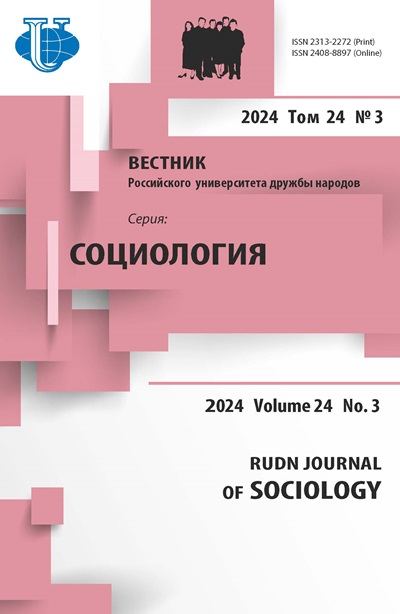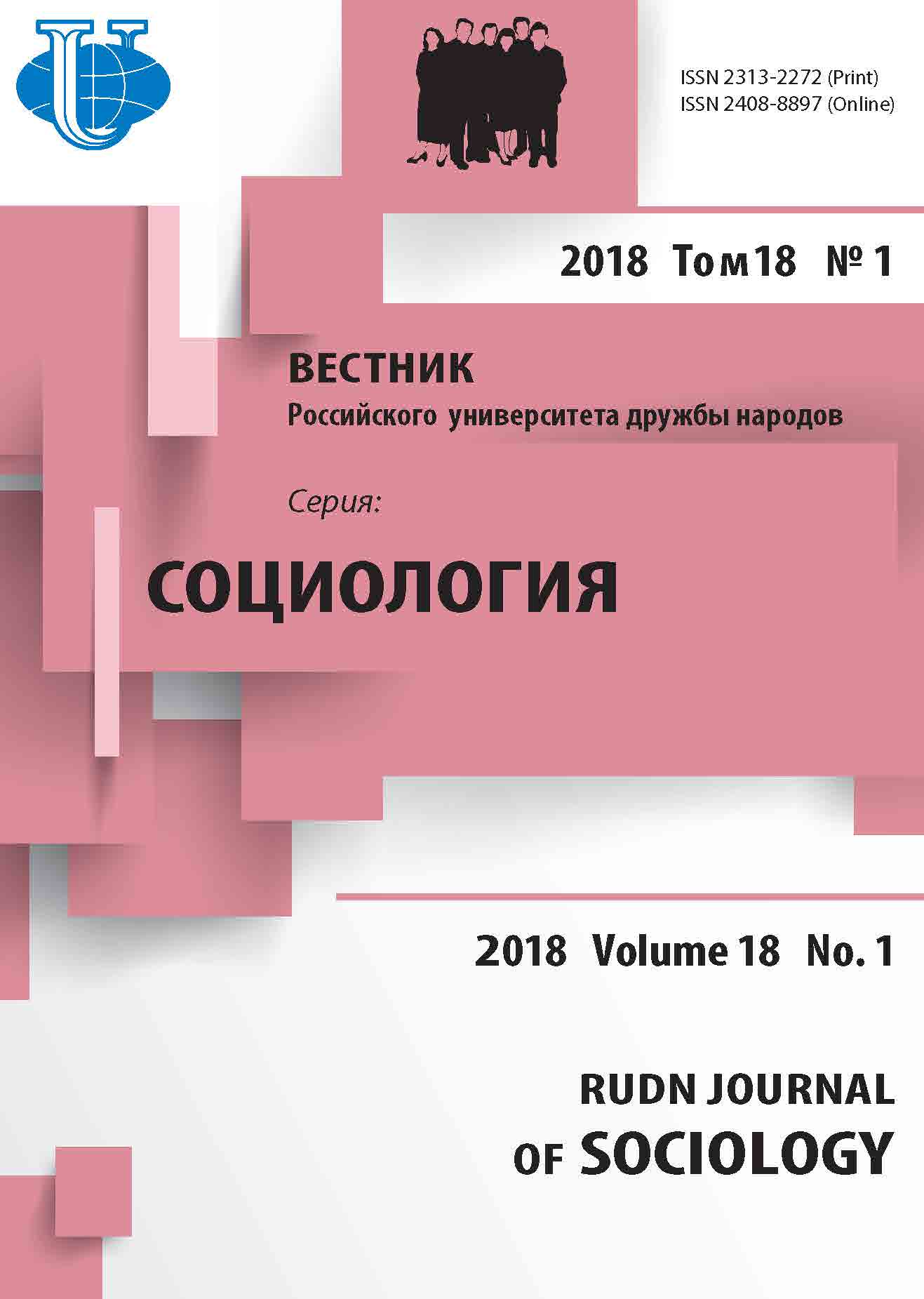SOCIAL DISTANCES AS A FEATURE OF THE CONTEMPORARY RUSSIAN SOCIAL SPACE
- Authors: Belyaeva LA1
-
Affiliations:
- Institute of Philosophy of the Russian Academy of Sciences
- Issue: Vol 18, No 1 (2018)
- Pages: 58-72
- Section: Contemporary society: the urgent issues and prospects for development
- URL: https://journals.rudn.ru/sociology/article/view/17826
- DOI: https://doi.org/10.22363/2313-2272-2018-18-1-58-72
Cite item
Full Text
Abstract
Social space is a theoretical construct that allows to consider many key problems of social development including the society’s consolidation. The author defines social space as a set of social statuses and distances. Their objective characteristics are interrelated with subjective indicators identified through the opinions of individuals. The balance of statuses and distances in society and the acceptability of this structure for the majority of population ensure the stability of society and effective social control. If this balance is disturbed, social tensions arise and threaten the stability and consolidation of society. Thus, the ideas of the theories of social space possess a considerable heuristic potential for revealing urgent problems of social development such as solidarity, social stratification and mobility, social networks and their interaction, connections of local communities within and with the world, interaction of structured social relations and individual and collective practices, genesis of social space as a result of social production represented by both things and relationships, etc. According to the theory of P. Bourdieu, the author con-siders social space as a structure of social statuses based on the set of different types of capital: economic, cultural, social, and symbolic. The author uses statistical data and results of the monitoring survey conducted on the all-Russian sample. The article proposes some tested empirical indicators that proved the increase of social distances in Russia due to the redistribution of economic capital and, as a consequence, of cultural and social capitals. Thus, the social space of Russia cannot be considered stable. To ensure its greater stability we need a set of measures to reduce social distances: re-industrialization to create high-tech jobs, development of digital economy, and improvement of the mass secondary and higher education system - these measures can create a basis for the upward social mobility.
About the authors
L A Belyaeva
Institute of Philosophy of the Russian Academy of Sciences
Author for correspondence.
Email: bela46@mail.ru
Goncharnaya St., 12/1, Moscow, Russia, 109240
References
- Babich N.S., Batykov I.V. Ordinalnoe shkalirovanie [Ordinal Scaling]. Krasnodar; 2004 (In Russ.).
- Belyaeva L.A. Socialnoe prostranstvo: ot teoreticheskih postroenij k empiricheskomu izucheniju [Social space: From theoretical constructions to the empirical study]. Filosofskie Nauki. 2012: 6 (In Russ.).
- Belyaeva L.A. Rossija i Evropa: struktura naselenija i socialnoe neravenstvo [Russia and Europe: The structure of population and social inequality]. Monitoring Obshestvennogo Mnenija: Ekonomicheskie i Socialnye Peremeny. 2010: 3 (In Russ.).
- Burgess E. Rost goroda: vvedenie v issledovatelskij proekt [The growth of the city: An introduction to the research project]. Lichnost, Kultura, Obschestvo. 2002: IV (1—2) (In Russ.).
- Bogardus E.S. Socialnaja distantsija v gorode [Social distance in the city]. Socialnoe prostranstvo: Mezhdisciplinarnye issledovanija: Referativnyj sbornik. Otv. red. L.V. Girko. Moscow; 2003 (In Russ.).
- Bourdieu P. Sociologija socialnogo prostranstva [Sociology of Social Space]. Per. s fr.; otv. red. N.A. Shmatko. Moscow — Saint Petersburg; 2007 (In Russ.).
- Bourdieu P. Sociologija politiki [Sociology of Politics]. Per. s fr., obsch. red. i predisl. N.A. Shmatko. Moscow; 1993 (In Russ.).
- Bourdieu P. Prakticheskij smysl [Practical Meaning]. Saint Petersburg; 2001 (In Russ.).
- Bourdieu P. Razlichenie: socialnaja kritika suzhdenija [Distinction: A social critique of the judgment]. Per. s fr. O.I. Kirchik. Ekonomicheskaja Sociologija. 2005: 6 (3) (In Russ.).
- Grani rossijskogo obrazovanija [Dimensions of Russian Education]. Moscow; 2015 (In Russ.).
- Simmel G. O skreschenii socialnyh krugov [On intersecting social circles]. Simmel G. Izbrannoe. Vol. 2. Moscow; 1996 (In Russ.).
- Latov Yu.V., Petukhov V.V. Vypolnjajut li rossijskie srednie sloi rol socialnogo stabilizatora (po dannym sociologicheskih oprosov)? [Do the Russian middle strata play the role of a social stabilizer? (based on opinion polls)]. Monitoring Obschestvennogo Mnenija: Ekonomicheskie i Socialnye Peremeny. 2017: 6 (In Russ.).
- L’vov D. Strategija razvitija Rossii [Strategy for the development of Russia]. http://www.perspektivy.info/table/strategija_razvitija_rossii_2007-03-16.htm (In Russ.).
- Ethington P.J. The intellectual construction of ‘social distance’: Toward a recovery of Georg Simmel’s social geometry. Cybergéo. 1997: 30.














